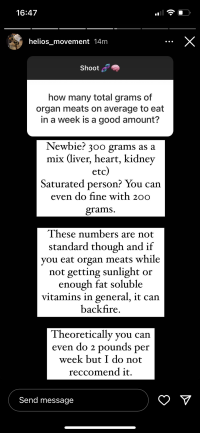Limon9
Member
They do, but not a whole lot of it compared to someone on the daily half-gallon of milk (full of killcium) and bi-weekly beef liver. Genereux's theory revolves around the notion that an unspecified, tolerable intake can probably be continued for a lifetime, but that if one falls through the trapdoor of toxicity, they must restrict far more rigorously thereafter. None of his books address why primates tolerate so many killretinoids, either.Asian diets do incorporate vitamin A in the form of vegetables and fruits typically though too.
Edit: Speaking of Asians, one of the most amusing parts in his books is praising the Okinawans (see: two daily pounds of sweet potato) for their "low vitamin A diet".
Last edited:

